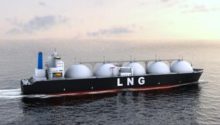contributors
Igor Tomberg

Head of Centre for Energy and Transportation Studies, Russian Institute of Strategic Studies and Professor at Moscow State Institute of International Relations
all articles


Although Europe is still enjoying warm fall weather, Gazprom is shipping record-breaking quantities of gas westward. Those deliveries topped out at a historic high on Oct. 21, at which point Gazprom was supplying its European customers with precisely 590 million cubic meters of gas each day. As Alexey Miller, the chairman of Gazprom, has noted, winter isn’t even here yet, but European demand for Russian gas is already at levels consistent with deep-freeze conditions…


It’s finally happened! For so many years the world has been alternately frightened, reassured, and blackmailed by the idea of European and Asian markets getting massive amounts of American liquefied natural gas (LNG) sourced from shale. And now that has come to pass…


At the G20 summit in St. Petersburg the heads of Gazprom and CNPC, Alexei Miller and Zhou Jiping, signed an agreement on the main terms of delivery of gas from Russia to China via the eastern route… This is a matter of a strategic partnership between Russia and China, and the task of building the economic foundation for such a partnership goes beyond the interests of individual companies, even large ones. On the Russian side, both Gazprom and Rosneft are acting as operators in achieving important state goals…


…The leaders of 13 states – Algeria, Bolivia, Venezuela, Egypt, Iran, Qatar, Libya, Nigeria, United Arab Emirates, Trinidad and Tobago, Equatorial Guinea, Oman and Russia, which together control more than 70 percent of natural gas reserves, 45 percent of its exports and a third of all the world’s gas pipelines, along with Kazakhstan, Norway, the Netherlands and Iraq as observers – gathered together in Moscow… And the most important thing which is most relevant right now, but which unfortunately did not get much coverage at the Gas Exporting Countries Forum, is the scramble for Asia’s gas markets that is already underway…


Though Vladimir Putin planned his two-day visit to Beijing (from October 11 to 12) as the current Prime Minister in the result but arrived there as the future president. It is quite symbolic that in his new status Putin made his first foreign to China where he definitely could not avoid speaking about changes in the Russian foreign policy, which is by all accounts turning towards the East. The receiving party, which traditionally gives Putin a warm welcome, has seized the shift of Moscow’s foreign policy and the commonality in setting strategic tasks on the global level…


The coming visit of Russia’s Prime Minister Vladimir Putin to China on October 11-12 will be aimed at giving stability to the Russian-Chinese strategic partnership in the economy. Energy industry traditionally tops the list of complicated and sometimes pressing issues of the Russian-Chinese partnership…


The impact of a further decoupling of gas prices from the oil reference price will not be limited to damages to suppliers' balance sheets – it will translate into the demise of the European gas trade architecture as a whole…


On October 30, Russian president D. Medvedev attended the second Russia – ASEAN summit in Hanoi… Moscow's assertiveness in Hanoi and its plan to host the 2012 Asia-Pacific summit signal a rising awareness about Asia in the ranks of Russian decision-makers…


Moscowmay be wary to let Turkmenistan gain independent access to the European gas market but will eagerly assist Ashgabat in reaching out to other potential buyers. Notably, Russia's involvement in the supply of Turkmen gas to India and Pakistan across Afghanistan was on the agenda of the talks in Ashgabat…



